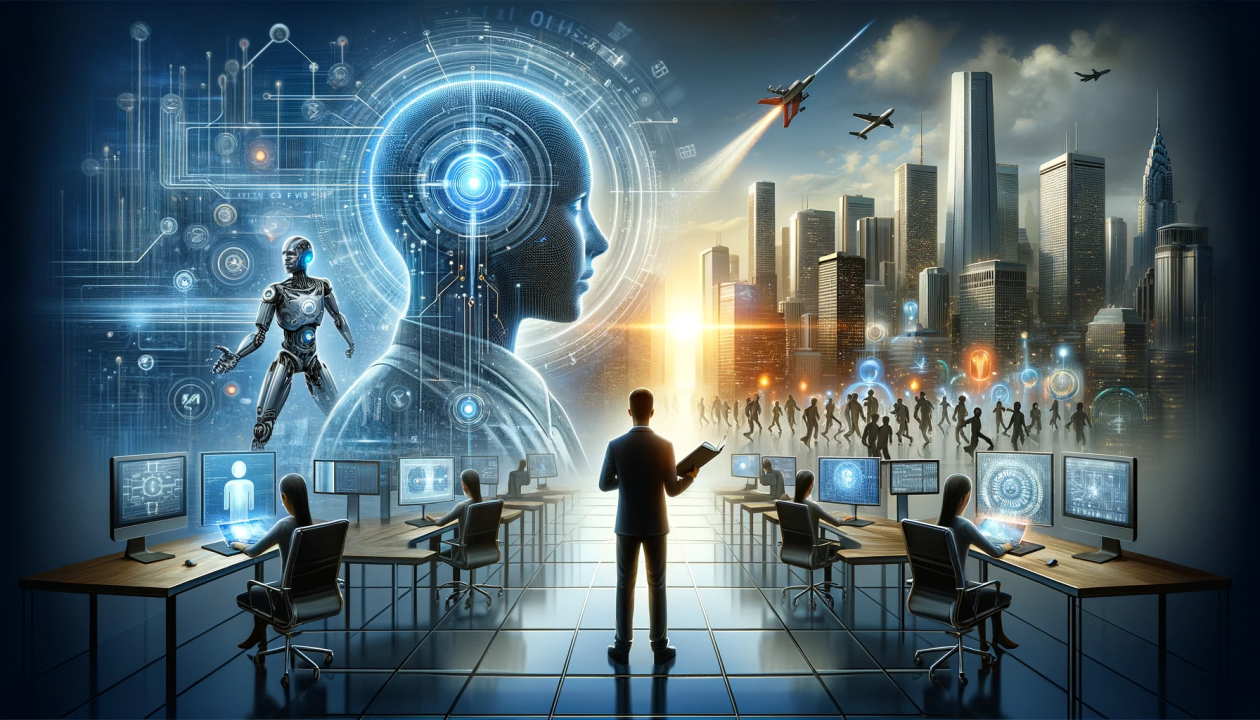If AI Job Displacement Becomes Reality: A Look at Our Future Society
AI job displacement is reshaping our world in ways we never imagined possible.
As I sit here, contemplating the future of work, I can’t help but feel a mix of excitement and trepidation.
The rapid advancement of artificial intelligence and automation technologies has brought us to a crossroads, where the very nature of employment is being redefined.
Gone are the days when we could rely on traditional career paths and job security.
Instead, we find ourselves in a landscape where machines are increasingly capable of performing tasks once thought to be exclusively human domains.
This shift is not just affecting low-skilled jobs; it’s reaching into professional fields, creative industries, and even leadership positions.
The question that looms large in my mind, and I’m sure in the minds of many others, is: what does this mean for us, for our children, and for the future of society as a whole?
We strongly recommend that you check out our guide on how to take advantage of AI in today’s passive income economy.
Table of Contents
The Current State of AI and Automation
The Acceleration of Change
AI job displacement is no longer a distant concept but a present reality.
In recent years, we’ve witnessed an unprecedented acceleration in the development and deployment of AI technologies across various sectors.
From manufacturing to healthcare, finance to customer service, AI is making its presence felt in ways both subtle and profound.
The pace of change is breathtaking, with new breakthroughs seemingly announced every week.
As someone deeply interested in technology, I find myself constantly amazed by the capabilities of these systems.
Yet, I can’t ignore the implications for the workforce.
The jobs that once seemed safe from automation are now squarely in the crosshairs of AI developers.
Industries at Risk
When we talk about AI job displacement, certain industries immediately come to mind as being particularly vulnerable.
Retail is a prime example, with self-checkout machines becoming ubiquitous in supermarkets and department stores.
I remember the first time I encountered one of these machines; it felt novel and a bit awkward.
Now, they’re so commonplace that it feels strange when a store doesn’t have them.
But it’s not just retail that’s feeling the impact.
Customer service roles are being transformed by chatbots and AI-powered support systems.
Data entry positions, once a reliable entry point for many office workers, are rapidly disappearing as software becomes more sophisticated.
Even creative fields like graphic design and content creation are seeing the encroachment of AI tools that can generate images and write articles with minimal human input.
The Impact on Employment
Job Losses and Transformations
AI job displacement is causing ripples throughout the job market, affecting both blue-collar and white-collar positions.
According to recent studies, millions of jobs could be at risk over the next decade.
It’s a sobering thought, and one that keeps me up at night.
I think about friends and family members whose careers might be upended by these changes.
Will they be able to adapt?
What new skills will they need to learn to remain relevant in an increasingly AI-driven economy?
The transformations we’re seeing are not always straightforward job losses, however.
In many cases, roles are being redefined, with AI taking over certain tasks while humans focus on others.
This shift requires a new set of skills and a different mindset from workers.
The Skills Gap
As AI job displacement continues, we’re seeing a widening skills gap in the workforce.
The jobs that remain, and the new ones being created, often require a high level of technical proficiency or specialized knowledge.
This presents a significant challenge for many workers, especially those in mid-career who may find it difficult to retrain or pivot to new industries.
I’ve spoken with friends who are grappling with this reality, trying to figure out how to stay relevant in their fields.
Some are taking online courses, others are considering going back to school full-time.
It’s a daunting prospect, especially for those with families to support and financial obligations to meet.
The Economic Implications
Productivity Gains vs. Job Losses
One of the most touted benefits of AI and automation is increased productivity.
Machines can work tirelessly, without breaks, and often with greater precision than humans.
This has led to significant gains in efficiency across many industries.
However, the question that nags at me is: at what cost?
If AI job displacement leads to widespread unemployment, who will benefit from these productivity gains?
It’s a complex issue, with no easy answers.
On one hand, increased productivity could lead to lower prices for goods and services, benefiting consumers.
On the other hand, if large segments of the population are out of work, they may not be able to afford these products, no matter how cheap they become.
Income Inequality
AI job displacement has the potential to exacerbate existing income inequality.
Those who own the AI and automation technologies stand to benefit enormously, while those whose jobs are displaced may struggle to find new sources of income.
This widening gap between the haves and have-nots is concerning, to say the least.
I worry about the social and political implications of such inequality.
History has shown us that extreme disparities in wealth can lead to social unrest and political instability.
Are we heading down a path that could lead to such outcomes?
What can be done to ensure that the benefits of AI are more evenly distributed?
Adapting to the New Reality
Education and Retraining
As we face the challenges of AI job displacement, education and retraining will be crucial.
The skills that were valuable in the past may not be as relevant in an AI-driven future.
I’ve been thinking a lot about what this means for our education system.
How can we prepare students for jobs that don’t yet exist?
What fundamental skills will be important regardless of technological change?
For those already in the workforce, continuous learning and upskilling will be essential.
I’ve started to invest more time in learning about AI and machine learning, not because I plan to become a developer, but because I believe understanding these technologies will be crucial in navigating the future job market.
Embracing Human Strengths
While AI excels at many tasks, there are still areas where human skills are irreplaceable.
Creativity, emotional intelligence, and complex problem-solving are just a few examples of skills that AI has yet to master fully.
As we adapt to AI job displacement, it’s important to focus on developing and leveraging these uniquely human strengths.
I’ve noticed that many of my colleagues who are thriving in this new environment are those who excel at interpersonal skills and creative thinking.
They’re able to work alongside AI systems, using them as tools to enhance their own capabilities rather than viewing them as threats.
The Societal Impact
Social Safety Nets
As AI job displacement becomes more prevalent, we need to consider how our social safety nets will adapt.
Traditional unemployment insurance and job retraining programs may not be sufficient to address the scale of the challenge we’re facing.
I’ve been reading about proposals for universal basic income (UBI) and other innovative approaches to supporting displaced workers.
While these ideas are controversial, I think it’s important that we have serious discussions about how to support those who are left behind by technological change.
The alternative – a large segment of the population with no means of support – is simply not sustainable.
Mental Health and Well-being
The psychological impact of AI job displacement shouldn’t be underestimated.
For many people, their work is a source of identity, purpose, and social connection.
Losing a job to automation can be devastating, not just financially but emotionally as well.
I’ve seen friends struggle with depression and anxiety after being laid off, their sense of self-worth shaken by the experience.
As a society, we need to consider how we can support people through these transitions, not just economically but psychologically as well.
The Ethical Considerations
Responsibility and Accountability
As AI systems take on more complex tasks and decision-making roles, questions of responsibility and accountability become increasingly important.
When an AI makes a mistake – whether it’s a self-driving car accident or a biased hiring decision – who is held responsible?
These are thorny issues that we’re only beginning to grapple with.
I believe that as AI job displacement continues, we’ll need to develop new legal and ethical frameworks to address these challenges.
It’s not enough to simply let the technology develop unchecked; we need to actively shape its implementation to align with our values and societal goals.
Privacy and Data Concerns
The AI systems driving job displacement rely on vast amounts of data to function effectively.
This raises important questions about privacy and data ownership.
As more of our work and personal lives become intertwined with AI systems, how do we protect our personal information?
I’m increasingly aware of the digital footprint I’m leaving and the ways in which that data might be used – or misused – by AI systems.
Balancing the benefits of AI with the need for privacy and data protection will be an ongoing challenge as we navigate this new landscape.
The Future of Work
New Job Creation
While AI job displacement is a significant concern, it’s important to remember that new technologies also create new job opportunities.
Throughout history, technological revolutions have led to the emergence of entirely new industries and job categories.
I’m optimistic that the AI revolution will be no different.
Already, we’re seeing new roles emerging in fields like AI ethics, data science, and human-AI collaboration.
The challenge will be ensuring that these new opportunities are accessible to a wide range of people, not just those with advanced technical skills.
The Gig Economy and Flexible Work
AI job displacement is likely to accelerate the trend towards gig work and flexible employment arrangements.
As traditional full-time jobs become scarcer, more people may turn to freelance work or portfolio careers, piecing together income from multiple sources.
This shift brings both opportunities and challenges.
On the one hand, it offers greater flexibility and the potential for a better work-life balance.
On the other hand, it can lead to job insecurity and a lack of benefits traditionally associated with full-time employment.
I’ve experimented with gig work myself, and while I appreciate the flexibility, I also miss the stability and sense of community that comes with a traditional job.
Policy Responses
Government Intervention
As AI job displacement reshapes the economy, government policies will play a crucial role in managing the transition.
From regulations on AI development and deployment to support for displaced workers, policymakers face a complex set of challenges.
I believe we need a balanced approach that encourages innovation while also protecting workers and ensuring that the benefits of AI are broadly shared.
This might include investments in education and retraining programs, updates to labor laws to reflect the changing nature of work, and perhaps even consideration of more radical ideas like UBI.
Corporate Responsibility
Companies driving AI development and implementation have a responsibility to consider the societal impact of their technologies.
I’ve been encouraged to see some tech companies taking proactive steps to address AI job displacement, such as funding retraining programs or exploring ways to use AI to augment human workers rather than replace them entirely.
However, I think more needs to be done.
Companies should be transparent about their AI implementation plans and work closely with employees and communities to manage transitions.
Personal Reflections
Embracing Change
As I reflect on the challenges and opportunities presented by AI job displacement, I’m reminded of the importance of adaptability and lifelong learning.
The pace of technological change is unlikely to slow down, and those who can embrace this change and continuously evolve their skills will be best positioned to thrive.
I’ve made a personal commitment to stay curious and open-minded, to view AI not as a threat but as a tool that can enhance my own capabilities.
It’s not always easy, and there are days when the rapid pace of change feels overwhelming.
But I try to remind myself that humans have an incredible capacity for adaptation and creativity.
Finding Meaning in a Changing World
Perhaps the most profound challenge posed by AI job displacement is not economic but existential.
As machines take over more of our work, we’re forced to confront questions about the role of work in our lives and what gives us meaning and purpose.
I’ve found myself thinking more deeply about what truly matters to me, beyond my job title or career achievements.
In a world where AI can perform many tasks more efficiently than humans, what unique value can we bring?
For me, it’s about human connection, creativity, and the ability to empathize and understand complex emotional and social dynamics.
These are areas where I believe humans will continue to excel, even as AI becomes more sophisticated.
Conclusion
AI job displacement is reshaping our world in profound and sometimes unsettling ways.
As we navigate this transition, it’s important to approach the challenges with a mix of caution and optimism.
The potential benefits of AI are enormous – from solving complex global problems to freeing us from mundane and repetitive tasks.
But realizing these benefits while minimizing the negative impacts on workers and society will require thoughtful planning, robust policy responses, and a commitment to lifelong learning and adaptation.
As individuals, we must stay informed, be proactive in developing our skills, and remain flexible in our career paths.
As a society, we need to have serious discussions about the kind of future we want to create and how we can harness the power of AI for the benefit of all.
The road ahead may be uncertain, but I believe that by working together and embracing our uniquely human qualities, we can create a future where AI enhances rather than diminishes our lives and work.
The challenge of AI job displacement is not just a technological one, but a deeply human one.
How we respond to it will shape the kind of society we become.

We strongly recommend that you check out our guide on how to take advantage of AI in today’s passive income economy.




